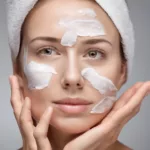29 November 2023
Exploring the Causes, Treatments, and Skincare Tips for Facial Peeling
Skin peeling on the face can be a common occurrence, often resulting from damage or loss of the upper layer of skin. While it is a natural response to promote skin regeneration, excessive or persistent peeling can be a cause for concern. Understanding the causes and finding the right treatments for facial peeling is crucial for maintaining healthy and radiant skin. This article delves into the various causes of skin peeling on the face, explores effective treatment options, and provides essential skincare tips to manage this condition.
How to Control Facial Skin Peeling:
Medical Treatments
– Different Medications for Chronic Conditions: Certain long-term medications used to treat chronic conditions can cause excessive skin drying and subsequent peeling. Consulting with a healthcare provider to explore alternative medications can help alleviate this issue.
– Systemic Antibiotics: Bacterial infections like impetigo or infected eczema can cause facial skin peeling. Prescribed antibiotics are typically used to eradicate the bacteria and promote healing.
– Topical Corticosteroids: These ointments or creams can effectively treat the symptoms of peeling and flaking skin on the face. Different potency levels are available, depending on the severity of the condition.
Over-the-Counter Products
– Moisturizers: Dermatologists recommend applying fragrance-free ointments or creams immediately after washing and drying the face to hydrate the skin and reduce peeling.
– Anti-Inflammatory Pain Relievers: Nonsteroidal anti-inflammatory drugs (NSAIDs) like ibuprofen or naproxen sodium can help alleviate pain and inflammation associated with facial skin peeling.
Home Remedies
– Hydration: Increasing water consumption can improve skin hydration, reducing peeling and flaking.
– Aloe Vera or Soy: OTC moisturizers containing aloe vera or soy, known for their antioxidant properties, can accelerate the healing process for sunburn or damaged skin.
– Honey: Research suggests that honey possesses properties that promote tissue repair and modulate immune responses, making it beneficial for healing peeling facial skin.
– Cool Compresses and Showers: Applying cool compresses to sunburned skin or taking cool showers can provide relief and prevent further peeling. Avoid using soaps or bath oils that may irritate the skin.
Skin/Chemical Peels:
A chemical peel is a cosmetic procedure that involves the application of an acid solution to the face. While it can address various skin concerns, aggressive removal of peeling facial skin is not advised, as it can prolong healing and increase vulnerability to bacteria.
Causes: Why Is the Skin Peeling on My Face?
Allergic or Inflammatory Reactions
– Contact dermatitis: Inflammation caused by direct contact with irritants or substances triggering an immune response.
– Atopic dermatitis: The most common form of eczema, characterized by itchy and rash-prone skin.
– Toxic epidermal necrolysis: A life-threatening skin disorder resulting from medication reactions.
– Cosmetic ingredients: Allergic reactions to common cosmetic ingredients can lead to facial peeling, swelling, or other symptoms.
Autoimmune and Infectious Diseases
– Pemphigus: An autoimmune disorder causing the body to attack cells in the outer layers of the skin and mucous membranes.
– Facial psoriasis: An autoimmune disease resulting in red or pink sores covered in silvery-white plaques that can flake or peel off.
– Staphylococcal scalded skin syndrome: A skin infection caused by certain strains of Staphylococcus bacteria, leading to extensive skin peeling.
Skin Conditions
– Sunburn: Overexposure to the sun or other ultraviolet light can cause skin peeling on the face.
– Xerosis cutis: Excessively dry skin due to changes in skin composition, leading to moisture loss.
– Edema: Swelling caused by fluid buildup in the body’s tissues, which can contribute to facial skin peeling.
– Seborrheic dermatitis: A type of eczema that causes flaky, dry skin on the face, scalp, and other areas.
– Acne: Certain acne treatments and medications can trigger facial skin peeling.
Other Factors
– Vitamin and mineral deficiencies: Lack of essential vitamins and minerals can contribute to dry facial skin, exacerbating peeling and flaking.
– Radiation therapy: Treatment for diseases like cancer can cause treated areas to become dark, dry, and prone to peeling.
Skin Care With Facial Peeling:
Proper skincare is essential for managing facial peeling and reducing symptoms. Tips include avoiding pulling off peeling skin, using gentle cleansing techniques, reading product labels carefully, applying moisturizers, using humidifiers, and protecting the face from harsh weather conditions.
Conclusion:
Understanding the causes and treatments for skin peeling on the face is crucial for maintaining healthy and vibrant skin. Whether it is due to chronic conditions, allergies, or environmental factors, finding the right approach to manage facial peeling is essential. By following proper skincare routines and seeking appropriate medical advice, individuals can effectively control and minimize the impact of facial skin peeling, promoting overall skin health and well-being.



